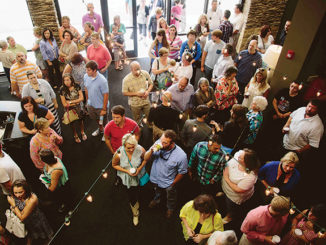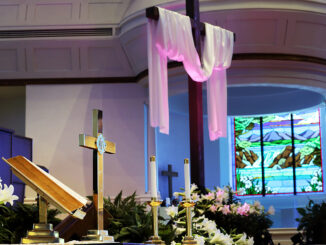
In our world today it has become quite common for some people to question the value of faith in general and organized religion in particular. Many go so far as to say that religion is a destructive force that makes the world we live in worse. So what is our response? How do we make the case that religion is worthwhile in the world today? I am going to lay out the results of a few studies that answer just that question.
The first response is that people who are actively involved in a church community are happier and more optimistic. There have long been anecdotes about people who were atheists and incredibly pessimistic who then became Christian and found not only faith but also happiness and hope for the future. C.S. Lewis and T.S. Elliot are just two examples of this. However, stories like this don’t often tell the whole story. There have been psychological studies that show that people who are active in a church community are significantly happier and more optimistic. This is not to say that all churchgoers are necessarily happier than non-churchgoers, but on average a person who goes to church is happier than one who does not.
A second response is that prayer has a measurable effect. A few years ago, there was a group of medical scientists who sought to test whether prayer had any impact on medical outcomes. They believed that there would be no impact, but they were wrong. The study showed that patients who were being prayed for were more likely to survive, recovered more quickly, and were generally more likely to have positive outcomes from their treatment. The authors of the study then hypothesized that the better outcomes were because the people knew they were being prayed for and so the support they felt was the real cause of the improved outcomes. So they repeated the study and did not tell the people that they were being prayed for. Still the improved results remained. The only foreseeable explanation? That prayer actually did something for the health of these patients.
One final response is that people who are active in their faith lives live longer. This is the most recent of these studies. A group of scientists looked at the factors affecting how long people lived and the first few results were what you would expect. A person who exercised at least weekly would live on average nine years longer than someone who did not, for example; but one that the researchers did not foresee was that a person who attended church services weekly lived on average three years longer than someone who did not attend church services at all.
Now these studies are not in any way meant to say that these are the primary benefits of faith. The primary benefits of faith cannot be measured by any study in this world. Those of us who are people of faith know that the true benefits of faith are not measured in such worldly ways. However, if we are to convince the unbelieving that there is benefit to what we do, these are scientific studies that that show concrete benefits in this world of the benefits of a life of faith and religious practice.
-by Fr. Daniel Dillard
About the Author: Fr. Daniel Dillard is pastor of St. Mary’s Catholic Church in Franklin, Ky. For more information, call 270-586-4515 or visit www.stmarysfranklin.cc.




